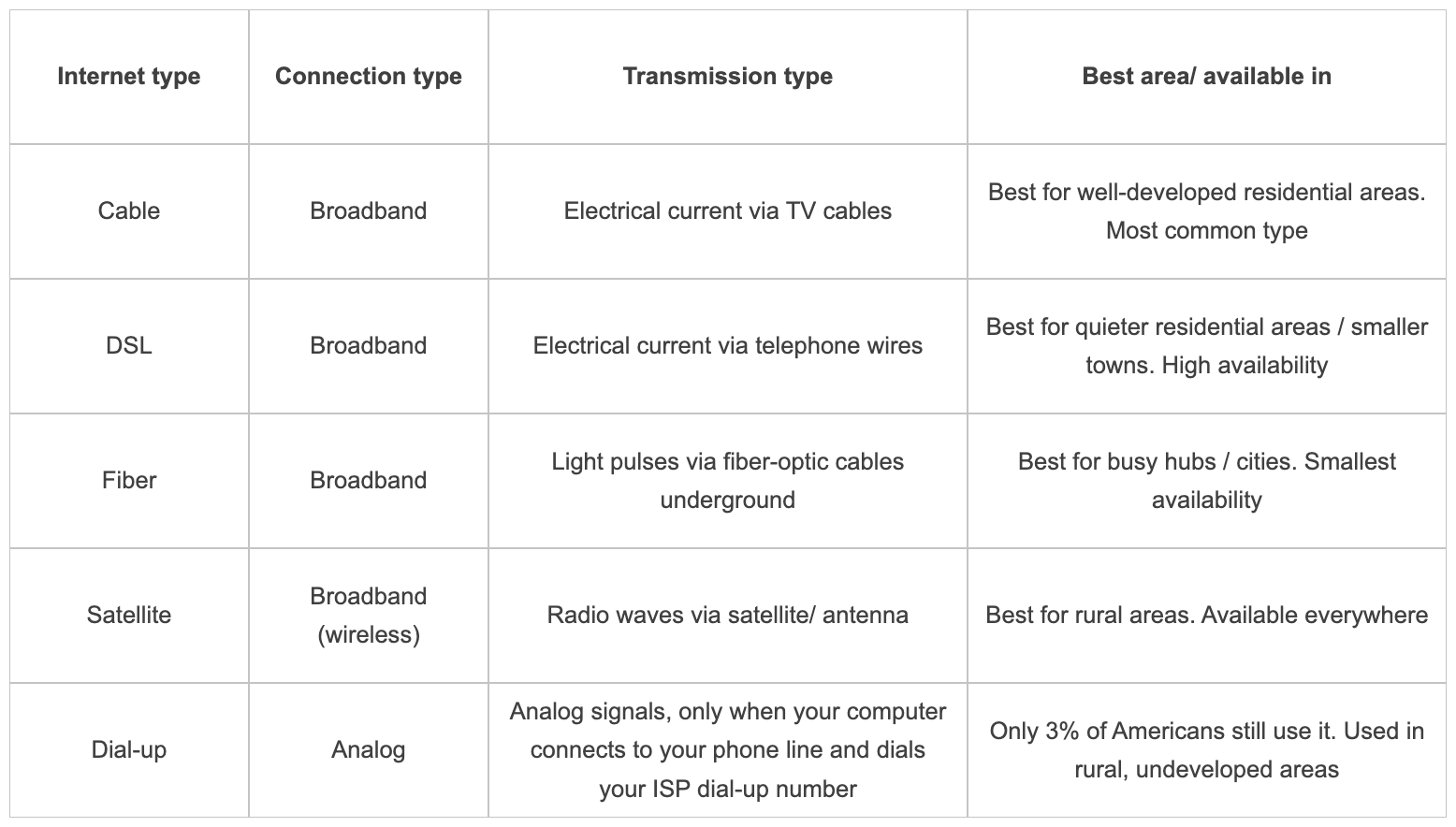Internet for Home: A Complete Buyer’s Guide

Amanda Morgan

Are you a first-time or non-technical buyer? This is the guide for you. When it comes to the internet, one size doesn't fit all. The countless options of service providers and internet plans is overwhelming, but they exist to suit a variety of internet users and neighborhoods. If you're looking to buy a home internet plan and are unsure of where to start, HomeLinkd has you covered.
Types of internet for home use
Selecting an internet plan starts with choosing an internet type. The kinds of internet for home available today vary in technology, infrastructure, price and ZIP code.
Read through the table below to familiarize yourself with what your options are.
There are 4 types of broadband internet connection and 1 analog option:

Cable
Cable is the most popular type of broadband connection in the US and is widely available. It's the second fastest internet after fiber, and is relatively affordable. It's common in well-developed areas and suited to a large range of internet users.
DSL
DSL is available to more Americans than cable is, but offers slower speeds. It's best for quieter areas and “casual browser" type users. It's cheaper than cable and its connectivity is well-regulated.
Fiber
The elite of the internets. Fiber offers the fastest speeds and the latest technology, but it's only available to 25% of Americans. It's also one of the more expensive options, for obvious reasons. It's suited for high usage and big-city-dwellers.
Satellite
Satellite is available to 100% of the population, but is slow and expensive. Satellite is only best for those who don't have other home internet plans to choose from.
Dial-up
Dial-up internet is becoming obsolete. Still, 3% of Americans use it. Its speeds are much slower than its broadband successors, reaching only 0.056 Mbps. Because it's cheap, it's suited to users who live in rural or low-income areas and those who hardly use the internet.
Fastest internet rank in speed
The fastest internet speeds as ranked by internet type are:
1.Fiber
2.Cable
3.DSL
4.Satellite
5.Dial-up
Decide on the right type of connection for your home internet
Once you've got a feel for what's out there, consider these factors next:
Availability
Your first point of concern should be this: that the type of internet you'd like is even an option. For example, if you'd like to sign up for fiber but it isn't available in your area, you'll be forced to opt for the types that are. Check your availability before you do anything else.
Speed
Speed is probably the second most important factor to consider. Do you need the fastest speeds around, or would you only utilize a standard Mbps rate? Remember —the more internet users in your household, the faster the speeds you'll need.
Cost
Are your eyes too big for your budget? Internet for home use is a necessity, but you don't have to splurge. There are plenty of reasonably priced options and numerous deals out there. Choose an internet plan that is good to your wallet.
Reliability
The ideal internet plan means nothing if it's provided by an ISP notorious for bad service or support. Ask your neighbors what service provider they use, and read the online reviews. You want your connection to be safe, secure, reliable, and to know that you have your provider's support if anything goes wrong.
Home internet plan: costs & pricing
You might think that better internet plans cost more —but that's not necessarily the case. Satellite, which offers the second slowest speeds, is actually the most expensive type of internet.
Here's what you can expect to pay per month on average, ranked from most expensive to most affordable.
1. Satellite: $123
2. Fiber: $59
3. Cable: $52
4. DSL: $50
5. Cable: $52
6. Dial-up: $8
There are additional costs to also be aware of. Look out for things like sign-up or promotional fees that may entice you at first, but which expire after a couple of months.
In general, you'll also pay a once-off installation fee, somewhere around $100. Satellite is an exception, costing up to $250. Some ISPs also include a free installation.
You may need to purchase a new router or modem too, or rent them from your ISP for an additional monthly fee.
Word of advice: find and calculate these hidden costs first.
Glossary of internet terms for beginners
Talking to a potential ISP, and they're throwing around terms you've never heard of? Brush up on basic internet jargon here:
Modem
The primary unit that connects the wider internet to your home network. Without one, you wouldn't be able to connect to the internet at all.
Router
A router connects multiple home devices to each other, allowing them to access the internet at once. This is the flat, square-like box with blinking lights and antenna.
Mbps VS MBps
Mbps stands for megabits per second, and is used to describe internet connection speed. MBps stands for megabytes per second and specifies how much of a file is downloaded or uploaded per second.
In simpler terms:
• Mbps for speed
• MBps for size
Gbps/ GBps
Gbps is one billion bits or bytes per second. Only fiber is capable of 1000Mbps or 1Ggps speeds.
Bandwidth
Bandwidth is different to internet speed, but also measured in Mbps, bandwidth is the volume of information that can be transmitted over a period of time. Think of it like the ‘brain capacity' of your internet connection.
Bandwidth throttling
Bandwidth throttling intentional slowing down of your internet service. This is done by your ISP to regulate network traffic, minimize bandwidth congestion during peak times, or when you're nearing your data cap.
Data cap
The data cap is the limit of your data allowance, usually for one month. Uncapped Wi-Fi refers to unlimited internet and is a popular choice for avid internet users.
DSL
DSL stands for Digital Subscriber Line. DSL internet is transmitted to your home via existing telephone cables.
FiOs
FiOS is an acronym for Fiber-Optic Service, referring to home internet plans that offer fiber-optic internet.
Compare and find an internet plan for your home
Once you've narrowed down options, done your research, and calculated all costs involved —it's time to make an informed decision. Browse through some of America's most popular ISPs and some of our best home internet plans here.










